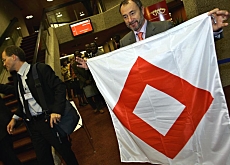Emblem deal earns Swiss top marks for effort

Experts agree that efforts to introduce an additional emblem for the Red Cross movement were worth the trouble, but no "great triumph" for Switzerland.
The 192 signatories to the Geneva Conventions approved the “red crystal” by a two-thirds majority after efforts to reach consensus without a vote failed.
The crystal offers a more neutral symbol for the Israeli emergency services, which do not use the existing red cross or red crescent.
Switzerland organised the conference, which wrapped up in the early hours of Thursday morning, in its capacity as the depositary state of the Geneva Conventions.
But hopes of unanimous support faded following the failure of last-ditch negotiations to resolve differences between Israel and Syria over humanitarian access to the Israeli-occupied Golan Heights.
Arnold Hottinger, a Swiss expert on Middle East affairs, told swissinfo that Switzerland had achieved a “very difficult compromise” which fell short of being a “great triumph”.
“As always, the Swiss were very much under Israeli influence, and the Israelis had an interest in the creation of a third emblem which would allow them to become a full member [of the Red Cross movement],” he said.
But he added that the Swiss should be credited for making the effort to “do something” about the emblem problem.
“The Swiss showed a sensitivity to the Israeli problem [of being outside the Red Cross movement], but they forgot that there are more sensitivities in the Middle East, including those of the Syrians.”
Hottinger believes the Swiss may have underestimated the complexity of Middle East politics.
“As soon as you change anything which has an impact on the very precarious situation in the Middle East, other countries come along and say that their point of view has not been respected enough,” he said.
“Good achievement”
Yves Besson, former Swiss diplomat and professor of Middle East studies at Fribourg University, believes that the conference represents a “good achievement” for the foreign ministry, even though its success should not be overplayed.
He said the outcome reflected well on efforts by Switzerland to develop a foreign policy focusing on human rights and humanitarian action. It also showed that the Swiss were beginning to master multilateral negotiation – something that had been lacking in the past.
Besson explained that two things were primarily responsible for this: Switzerland joining the United Nations in September 2002 and the arrival of Micheline Calmy-Rey at the head of the foreign ministry three months later.
He said the Swiss had paid a heavy diplomatic price for staying out of the UN for so long but were now beginning to catch up with the rest of the field in terms of “subtlety, flexibility, manoeuvring and negotiation”.
“We are learning and the UN is very useful for us. Fifteen years ago we would have shied away from anything political unless it had a strong economic or legal aspect. The difference in the past few years is that we are not afraid anymore of meddling in political issues.”
Middle East
Hottinger is not convinced that Switzerland’s latest diplomatic efforts will lead to a greater presence on the international stage – at least in the context of the Middle East conflict.
“Switzerland is at the end of the day always going to be a very minor player. The Swiss always have this idea that they can do something, which is to be welcomed.
“But when it comes to the Middle East, the real player is the United States, and everything else is poetry.”
Besson, who is a former director of the United Nations Relief and Works Agency, said that after an uncertain start with the Geneva Accord – a Swiss-sponsored unofficial peace plan – Switzerland had now found the right level on which to operate in the Middle East.
He believes that despite the odd note of discord, such as criticism over the security barrier and the shooting of a Swiss diplomatic vehicle, the Israelis have been happy to accommodate Bern’s humanitarian efforts.
This is partly because Swiss-led initiatives to ease the hardship of the Palestinian population relieve the Israelis of some of their obligations as an occupying power.
“The Swiss are active [in the region] but at a lower, much less political level. As long as we can bring something, some advantage to the Israelis, we will be able to do something,” said Besson.
“If you tell the Israelis what to do, it doesn’t work. You have to play within their matrix of control, and if you want to play outside this you will be rebuffed.”
swissinfo
Adoption of the red crystal by the signatory states to the Geneva Conventions follows months of delicate diplomacy by Switzerland.
The new emblem will enjoy the same status as the red cross and red crescent that have been in use for over a century.
Under the change, countries will be able to place symbols that they have used for some time inside the red crystal.

In compliance with the JTI standards
More: SWI swissinfo.ch certified by the Journalism Trust Initiative











You can find an overview of ongoing debates with our journalists here . Please join us!
If you want to start a conversation about a topic raised in this article or want to report factual errors, email us at english@swissinfo.ch.